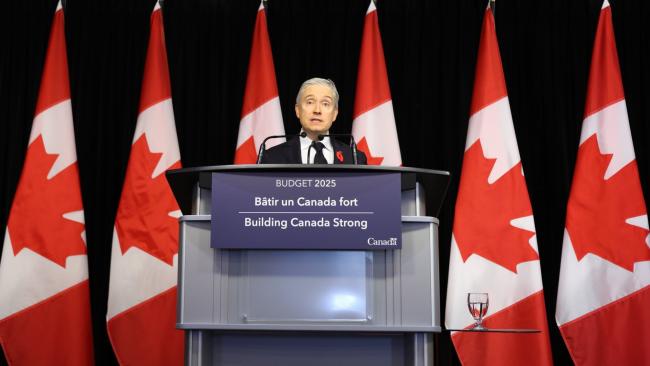Articles Menu

Nov. 4, 2025
The federal government’s commitment to “maximise carbon value for money” and “protect the competitiveness of oil and gas” as part of today’s budget represents a dramatic abdication of environmental leadership and a troubling step backward for climate action in Canada.
The budget makes clear that fossil fuel production for export is a central pillar of this government’s economic strategy — and that it won’t let climate measures get in the way.
The budget formally abandons the oil and gas sector emissions cap, which it says will “no longer be required” despite the sector accounting for 30 per cent of Canada’s climate pollution. The budget commits to weakening federal greenwashing legislation that currently prevents oil and gas companies from lying about their environmental impacts. The budget provides no assurances that the electric vehicle sales mandate will continue. And it drives the final nail into the coffin of the consumer carbon price.
At least $3 billion in climate-related federal spending also gets the axe, including a home energy efficiency retrofitting program, the Net-Zero Accelerator program for clean technology, funding for public transit and the government’s promise to plant two billion trees — all victims of a brutal $60-billion-over-five-year cut to federal public programs and services.
Fossil fuel subsidies, on the other hand, not only escaped cuts but were actually increased in the budget. Both the carbon capture tax credit and a tax break for liquefied natural gas (LNG) facilities were expanded at an additional cost to the public of $325 million over the next five years.
This budget marked the launch of the government’s so-called Climate Competitiveness Strategy, but it is a “climate” plan in name only. The budget does not lay out any plans to tackle greenhouse emissions in absolute terms. It also contains no new money for direct emissions reductions.
Nearly all the money that the strategy does include — amounting to $2.4 billion over five years — is set aside for critical minerals projects, which are as likely to feed into the defense industry as they are the clean tech sector. A $40 million allotment for a Youth Climate Corps is welcome, but it is not enough money to capture the transformative potential of the program or make a dent in youth unemployment.
In many respects, this is the most harmful budget from a climate perspective since the Harper era, writes Hadrian Mertins-Kirkwood - Blue Sky
Elsewhere, the government kicks the can down the road on important climate regulations that could meaningfully address emissions. The budget commits to strengthening the industrial carbon pricing system over time, but provides no concrete details. Finalized regulations to reduce methane emissions are likewise promised for some time in the future. And the long-awaited sustainable finance taxonomy, which would clarify the investment categories that are considered “green,” is punted to 2026.
It is a disheartening — if not entirely unexpected — turn for the federal government. In many respects, this is the most harmful budget from a climate perspective since the Harper era. But the broader shift away from climate priorities has been increasingly evident since this spring’s election.
The budget repeats Prime Minister Mark Carney’s framing that climate action should emphasize “results over objectives.” Yet by downplaying objectives — indeed, the Paris Agreement and Net-Zero Act are not mentioned once in the budget — we have no measure by which to judge results.
Similarly, the budget’s emphasis on “investment over prohibition” implies that we can solve the climate crisis through new economic activity alone. Yet it is only through reductions in certain economic activities — namely, the production and consumption of fossil fuels — that we can actually stop global warming.
The upshot is a climate strategy designed to profit from global climate action without making any meaningful effort to address Canada’s sizable contribution to the global climate crisis.
Perhaps the greatest irony of this approach — and the tragic legacy of this budget — is that it is not very strategic at all. The budget itself acknowledges that global investment in the clean economy already outstrips investment in fossil fuels, and that the gap is widening. Economies that cannot rapidly disentangle themselves from fossil fuels will be left behind by the ones that do.
Subsidizing a dying oil and gas industry and scaling back climate spending moves us in exactly the wrong direction. It is a costly blunder, mainly to the benefit of foreign fossil fuel investors, that makes our economy less competitive in the long-term.
Hadrian Mertins-Kirkwood is a senior researcher with the Canadian Centre for Policy Alternatives.
[Top photo: Finance Minister François-Philippe Champagne budget makes it clear that fossil fuel production for export is a central pillar of this government’s economic strategy — and that it won’t let climate measures get in the way. Photo by: Natasha Bulowski / Canada's National Observer]